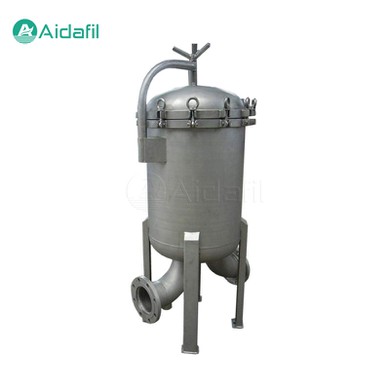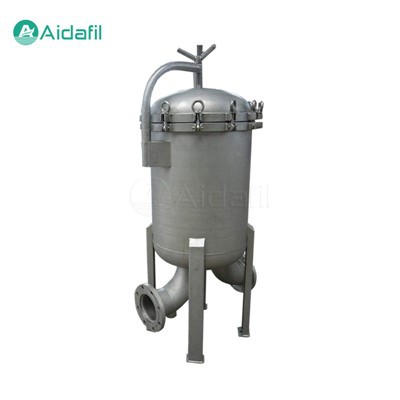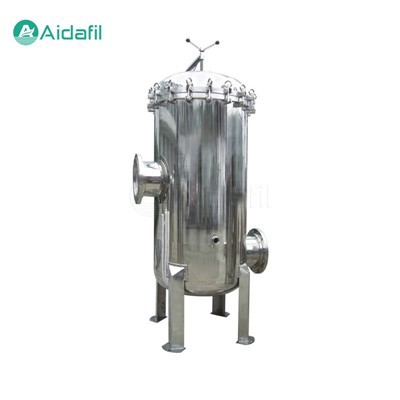
Heat-Resistant Security Filter
A heat-resistant security filter is composed of two primary elements: a stainless steel housing and a filter element. As liquids or gases pass through the filter element from the outside in, they converge and exit through the center. Impurities, such as particles of quartz sand or activated carbon, are trapped on the surface of the filter element, thereby achieving the goal of filtration and purification.

The heat-resistant security filter is a robust and durable filtration device designed to withstand the rigors of industrial environments. It consists of two main components: a stainless steel outer shell and a filter core. The outer shell provides protection and structural integrity to the filter, while the filter core is responsible for the actual filtration process.
The filter core is where the magic happens. It is designed to allow liquids or gases to pass through it while capturing and retaining any impurities or solid particles. The medium (liquid or gas) enters the filter from the outside and exits through the center, leaving the particles trapped on the surface of the filter core. This unique design ensures that the filtered fluid remains clean and free from any potentially harmful contaminants.
Applications of the Heat-Resistant Security Filter
The heat-resistant security filter finds extensive application in various industrial processes that require precise fluid filtration. Its primary use is in the multi-media pre-treatment filtration stage, positioned before membrane filtration devices such as reverse osmosis (RO) and ultra-filtration (UF) systems. Its purpose is to remove any remaining fine particles, such as tiny quartz sand or activated carbon granules, that may have passed through the multi-media filter. By doing so, it guarantees the water's filtration accuracy and protects the membrane filtration elements from damage caused by larger particles.
The working principle of the heat-resistant security filter is based on the use of formed filter materials. Under the action of pressure, the raw liquid passes through the filter materials, while the impurities are retained on the inner wall of the filter, and the clean fluid passes through the filter materials and exits. This process effectively separates the contaminants from the fluid, ensuring its purity and safety.
The Benefits of the Heat-Resistant Security Filter
The heat-resistant security filter offers a host of benefits that make it an indispensable component in industrial filtration systems. Some of the key advantages include:
1. High filtration accuracy. The security filter's ability to capture even the smallest particles ensures that the output fluid remains free from contamination, thereby maintaining product quality and equipment integrity.
2. Protection of membrane filtration elements. By removing large particles that could potentially damage sensitive membrane filters, the security filter extends the lifespan of these critical components, reducing maintenance costs and ensuring uninterrupted operation.
3. Versatile application. The security filter's ability to handle a wide range of fluid types and temperatures makes it an ideal choice for various industries, including water treatment, pharmaceuticals, food and beverage, and chemical processing.
4. Easy maintenance. The security filter features a quick-release design, allowing for easy removal and replacement of the filter core. This feature minimizes downtime and reduces the overall maintenance effort.
5. Robust and durable. Constructed from high-quality stainless steel, the security filter is designed to withstand the harsh conditions of industrial environments, including high temperatures, corrosive fluids, and aggressive media.
Field of Use
- Chemical Industry: To filter chemicals and ensure purity in manufacturing processes.
- Oil and Gas Industry: To filter crude oil and natural gas, removing impurities before refining.
- Food and Beverage Industry: To filter water and food products, maintaining quality and safety.
- Pharmaceutical Industry: To filter pharmaceutical products, ensuring compliance with stringent quality standards.
Common model flow rate
|
3 filter elements |
3 m³/h |
|
5 filter elements |
5-10 m³/h |
|
7 filter elements |
7-14 m³/h |
|
12 filter elements |
12-24 m³/h |
|
20 filter elements |
40 m³/h |
|
25 filter elements |
50 m³/h |
|
30 filter elements |
60 m³/h |
|
36 filter elements |
72 m³/h |
|
42 filter elements |
90 m³/h |
|
51 filter elements |
102 m³/h |
|
60 filter elements |
120 m³/h |
|
72 filter elements |
144 m³/h |
|
123 filter elements |
246 m³/h |
FAQ
1. Q: What is the function of a filter?
A: The main function of a filter is to remove solid particles, impurities, and harmful substances from liquids or gases, in order to achieve purification, clarification, and protection of equipment.
2. Q: How to choose a suitable filter?
A: When choosing a filter, factors such as the properties of the material being filtered (e.g., viscosity, temperature, corrosion), required filtration accuracy, processing capacity, operating pressure and medium, as well as the type, material, size, and installation method of the filter should be considered.
3. Q: What is the working principle of a filter?
A: The working principle of a filter mainly relies on physical screening, deep interception, absorption, or chemical reactions to remove impurities or harmful components from the material being filtered.
4. Q: How to maintain and care for a filter?
A: Maintenance of filters includes regular cleaning or replacement of filter elements, inspection of seals and fasteners, maintaining stable operating pressure, and avoiding overloading. Specific methods should be referenced from the filter's instruction manual and maintenance guides.
5. Q: What is the service life of a filter?
A: The service life of a filter depends on its working environment, processing volume, and filtration accuracy. Generally, when the filter's pressure drop reaches a certain value or the filtration effect decreases significantly, it needs to be replaced or cleaned.
6. Q: What should be paid attention to during filter installation?
A: During filter installation, attention should be paid to the directionality, ensuring that the fluid enters and exits from the correct ports. Also, the piping system should be cleaned before installation, and the filter should be securely fastened and sealed as required by the instructions.
7. Q: What is the replacement cycle for filters?
A: The replacement cycle for filters depends on their working conditions and filtration requirements, and is usually indicated by pressure difference indicators or timers. When the filter's pressure drop reaches the set value or the filtration effect decreases, it should be replaced in a timely manner.
Why Choose Us
· Professional manufacturer with many years' experience
· Good quality with competitive price
· OEM & ODM are welcome
· Various payment items are acceptable
· Good service by experienced manager
AIDA Philosophy
1. Management Concept:
· Satisfy the customers' demand --- Touch customers, trust with our products and services
· Make employees happy --- Pursue higher material and spiritual happiness
2. Company Mission:
· Focus on customer needs, provide best filtering solution
· To be the lifelong partner with customers
3. Corporate Vision:
· Become a global purification leadership brand
4. Values:
· Customer: Pursue the ultimate experience, enjoy excellent quality
· Team: Trust, responsibility, growth, win-win
· Work: Simple, sincere, efficient, dedicated
Hot Tags: heat-resistant security filter, China, factory, price, buy, coalescing filter element in air treatment system, high filtration efficiency duplex basket strainer, high pressure oil filter for paper mill, return oil filter for steel plant, long life span compressor oil separator, high effciency oil coalescing filter







